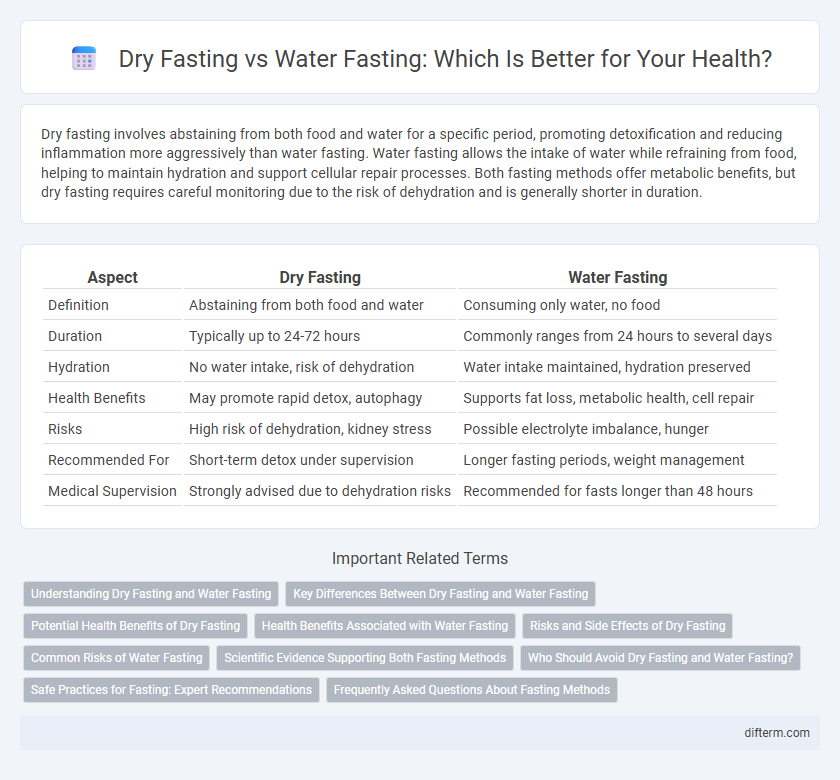Dry fasting involves abstaining from both food and water for a specific period, promoting detoxification and reducing inflammation more aggressively than water fasting. Water fasting allows the intake of water while refraining from food, helping to maintain hydration and support cellular repair processes. Both fasting methods offer metabolic benefits, but dry fasting requires careful monitoring due to the risk of dehydration and is generally shorter in duration.
Table of Comparison
| Aspect | Dry Fasting | Water Fasting |
|---|---|---|
| Definition | Abstaining from both food and water | Consuming only water, no food |
| Duration | Typically up to 24-72 hours | Commonly ranges from 24 hours to several days |
| Hydration | No water intake, risk of dehydration | Water intake maintained, hydration preserved |
| Health Benefits | May promote rapid detox, autophagy | Supports fat loss, metabolic health, cell repair |
| Risks | High risk of dehydration, kidney stress | Possible electrolyte imbalance, hunger |
| Recommended For | Short-term detox under supervision | Longer fasting periods, weight management |
| Medical Supervision | Strongly advised due to dehydration risks | Recommended for fasts longer than 48 hours |
Understanding Dry Fasting and Water Fasting
Dry fasting involves abstaining from both food and water for a specific period, promoting detoxification by forcing the body to use stored fat for energy while conserving water within cells. Water fasting allows the consumption of water during the fasting period, supporting hydration and facilitating metabolic processes such as autophagy and cellular repair. Understanding the physiological impacts of both methods helps determine appropriate fasting choices for health benefits and potential risks.
Key Differences Between Dry Fasting and Water Fasting
Dry fasting involves abstaining from both food and water, leading to accelerated detoxification and reduced inflammation, while water fasting permits fluid intake, supporting hydration and nutrient transport during the fast. The absence of water in dry fasting can result in quicker weight loss but poses higher risks like dehydration and electrolyte imbalance compared to water fasting. Metabolic responses differ as dry fasting triggers autophagy more intensely due to cellular stress, whereas water fasting promotes a gentler fat burning and detoxification process.
Potential Health Benefits of Dry Fasting
Dry fasting, which involves abstaining from both food and water, may promote enhanced cellular detoxification and autophagy compared to water fasting. Studies suggest dry fasting can trigger deeper metabolic shifts, leading to improved immune function and reduced inflammation. However, it requires careful supervision due to potential risks of dehydration and electrolyte imbalance.
Health Benefits Associated with Water Fasting
Water fasting promotes detoxification by allowing the body to eliminate toxins while maintaining hydration, which supports cellular repair and reduces inflammation. It enhances metabolic health by improving insulin sensitivity and encouraging fat burning, which may aid in weight loss and reduce the risk of chronic diseases like type 2 diabetes. Moreover, water fasting can stimulate autophagy, a natural process that helps remove damaged cells, potentially improving longevity and overall immune function.
Risks and Side Effects of Dry Fasting
Dry fasting, which involves abstaining from both food and water, poses significant risks such as severe dehydration, electrolyte imbalances, kidney damage, and an increased likelihood of fainting or heatstroke. Unlike water fasting, dry fasting accelerates the body's dehydration process, intensifying side effects like dizziness, headaches, and impaired cognitive function. Medical professionals warn that prolonged dry fasting can lead to organ failure and is not recommended without strict supervision.
Common Risks of Water Fasting
Water fasting, while popular for detoxification, poses common risks such as dehydration, electrolyte imbalances, and low blood sugar, which can lead to dizziness, fatigue, and cognitive impairments. Prolonged water fasting increases the risk of nutrient deficiencies and muscle loss due to the absence of calories and essential minerals. Medical supervision is crucial to monitor vital signs and prevent complications like heart arrhythmias or hypotension during extended fasts.
Scientific Evidence Supporting Both Fasting Methods
Scientific evidence highlights distinct metabolic effects of dry fasting and water fasting, with water fasting extensively studied for benefits like improved insulin sensitivity, autophagy, and reduced inflammation. Dry fasting, involving complete abstinence from water, triggers rapid ketosis and cellular repair mechanisms but lacks comprehensive clinical trials compared to water fasting. Research underscores the importance of hydration in fasting protocols, emphasizing that water fasting offers safer, well-documented health outcomes supported by randomized controlled trials.
Who Should Avoid Dry Fasting and Water Fasting?
Individuals with chronic health conditions such as diabetes, kidney disease, or heart problems should avoid dry fasting and water fasting due to risks of dehydration, electrolyte imbalance, and blood sugar fluctuations. Pregnant and breastfeeding women must refrain from these fasting methods to prevent nutrient deficiencies that can harm both mother and child. Elderly individuals and those with a history of eating disorders are also advised against dry and water fasting to avoid exacerbating underlying health issues.
Safe Practices for Fasting: Expert Recommendations
Experts emphasize the importance of hydration and monitoring electrolyte levels during fasting to avoid dehydration and electrolyte imbalance, which are common risks in dry fasting compared to water fasting. Medical supervision is recommended, especially for prolonged fasting periods, to tailor fasting protocols based on individual health status and preexisting conditions. Incorporating gradual fasting durations and breaking fasts with nutrient-dense, easily digestible foods improves safety and reduces adverse effects in both dry and water fasting practices.
Frequently Asked Questions About Fasting Methods
Dry fasting, which involves abstaining from both food and water, differs significantly from water fasting, where only food is withheld but water is consumed freely. Common questions about these fasting methods include their respective impacts on hydration, detoxification, and metabolic health, with water fasting generally considered safer due to sustained hydration. Research indicates dry fasting may lead to quicker detox effects but increases risks of dehydration and electrolyte imbalance, making medical supervision essential.
dry fasting vs water fasting Infographic

 difterm.com
difterm.com